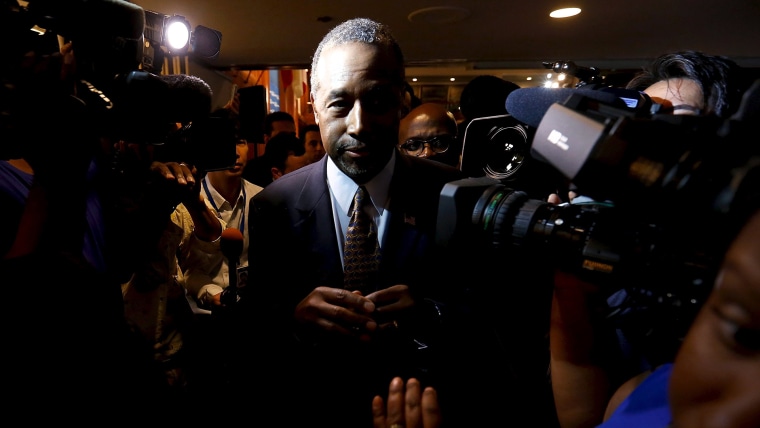The more questions arise about the veracity of Ben Carson's personal background, the more the Republican presidential candidate characterizes himself as a victim of unfair scrutiny. There's a tactical value to the argument -- it's vastly easier to attack news organizations than defend inconsistencies in his record -- that simultaneously panders to far-right activists who remain convinced that President Obama wasn't vetted in the 2007-2008 race.
Carson told NBC's Chris Jansing over the weekend, "I have always said that I expect to be vetted. But being vetted and what is going on with me, 'You said this 30 years ago, you said this 20 years ago, this didn't exist, this didn't.' You know, I just, I have not seen that with anyone else. Or if you can show me where that's happened with someone else, I will take that statement back."
NBC News' First Read highlighted some details that Carson may not remember from eight years ago.
We found a combined 165 New York Times and Washington Post articles that were all (or partially) about Barack Obama and Jeremiah Wright between the time Obama first launched his presidential bid (Feb. 2007) and his 2008 victory (Nov. 2008). During that same time period, we found an additional 41 New York Times and Washington Post pieces on Obama and Bill Ayers.
This doesn't even touch on the conspiratorial questions about Obama's birthplace.
The Washington Post took a step further yesterday, highlighting the kind of granular scrutiny Carson's 2016 rivals have faced, from an essay Bernie Sanders wrote 43 years ago, to Jeb Bush's experimentation with drugs in high school, to months of obsessive coverage about Hillary Clinton's email server management.
Carson feels put upon, as if he's been singled out by reporters overeager to pick on him, largely because he's not at all accustomed to being scrutinized. He was a celebrated surgeon, whose judgment and credibility were unquestioned.
Now that he's seeking the nation's highest office, Carson suddenly finds media professionals asking him about his claims that appear to untrue -- and he's outraged. How dare journalists press a presidential candidate about dubious stories he may have made up. Don't they understand? He's Ben Carson!
What he and other first-time candidates often fail to appreciate is the point of a rigorous vetting process. Part of this process, of course, is to provide the American electorate with the most complete information possible about would-be presidents. Voters can't simply expect candidates to tell their own stories; the public relies on news organizations to do their own investigations, uncovering details campaigns would prefer to ignore.
But another part of the process is baptismal: the presidency is unimaginably difficult. Withstanding the rigors of a national campaign offers a mere hint of the kind of pressures a candidate would face in the White House.
Or as First Read's report put it, "[I]f you can't deal with the news media picking apart your autobiography and your past speeches, you probably won't be able to deal with the bad news that inevitably comes your way as president."
Carson is increasingly offended by fair questions. That says more about the candidate than the scrutiny.
